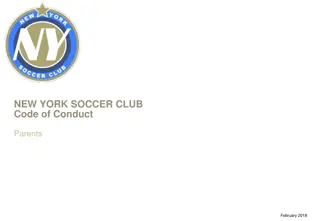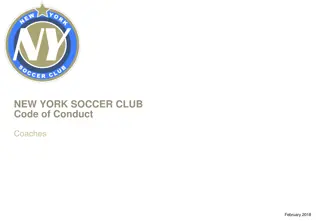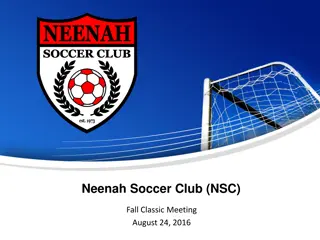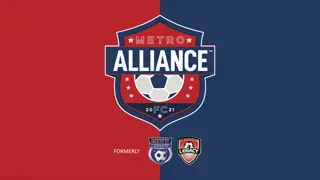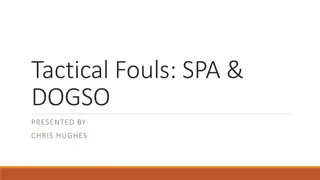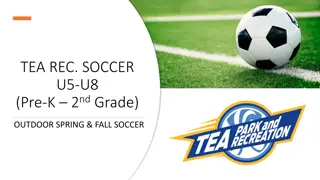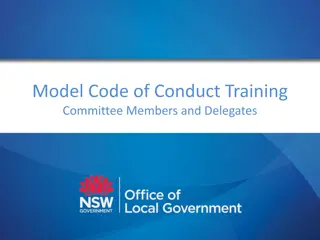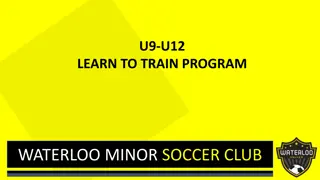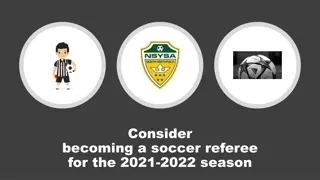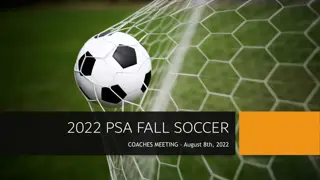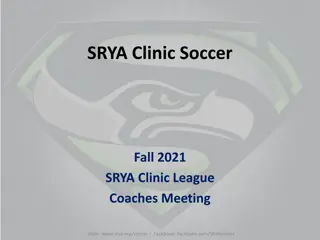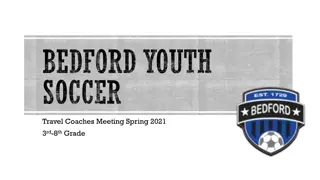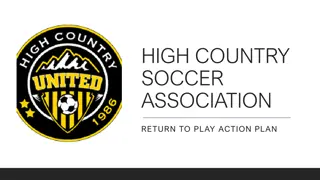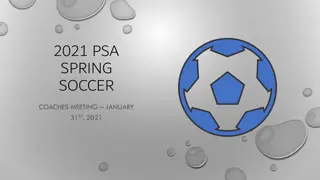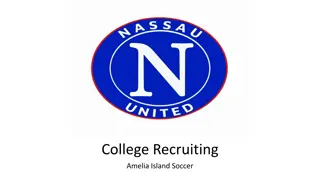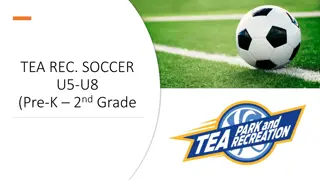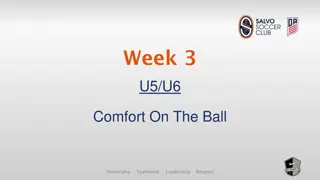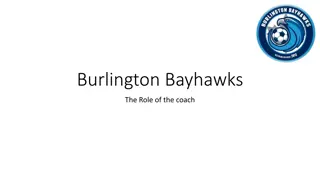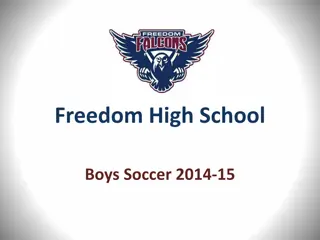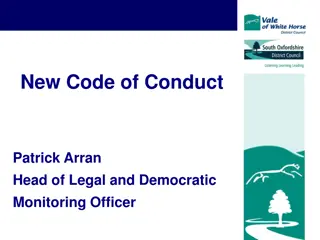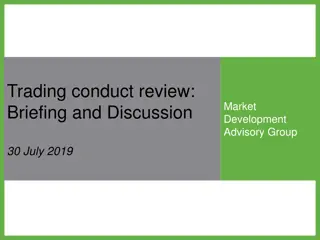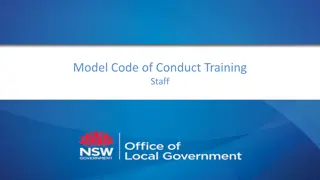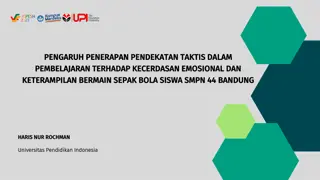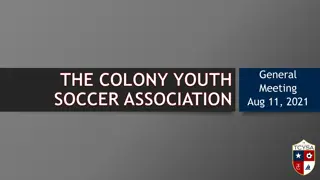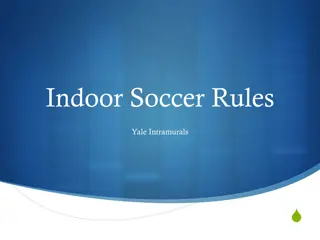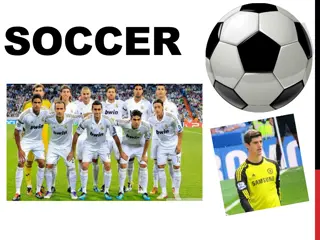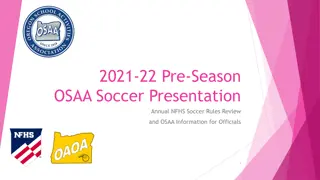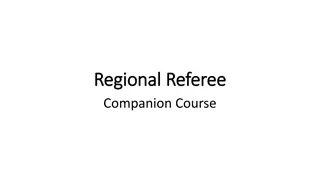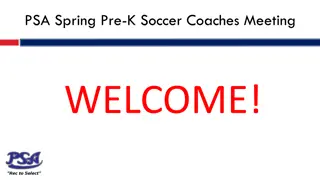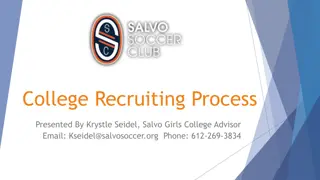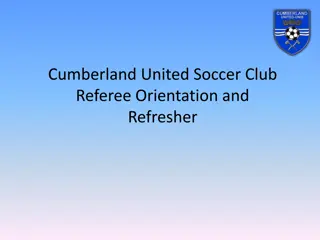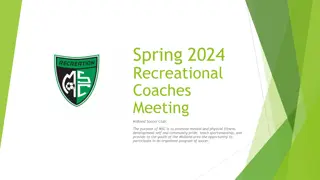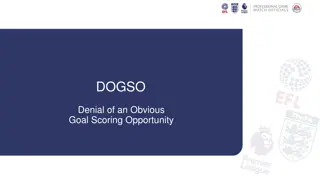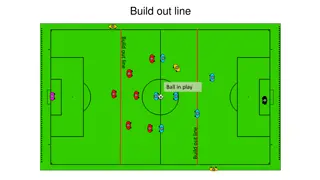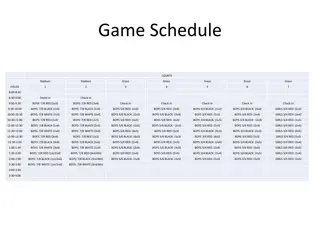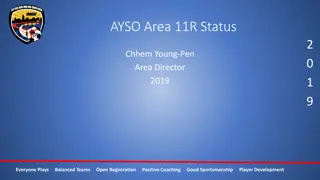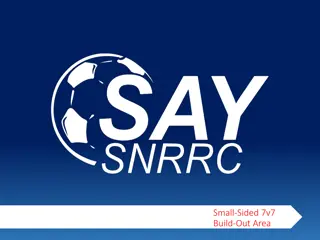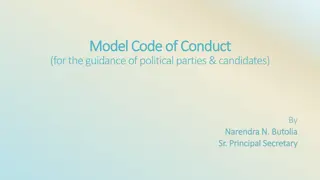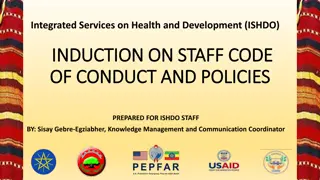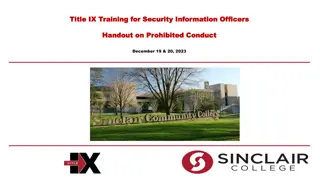New York Soccer Club Code of Conduct for Players
The New York Soccer Club Code of Conduct for Players outlines the expectations and principles that players should adhere to, promoting professionalism, respect, punctuality, commitment, and positive behavior both on and off the field. It emphasizes the values of sporting excellence, personal development, and mutual respect among players, coaches, and the club community.
Download Presentation

Please find below an Image/Link to download the presentation.
The content on the website is provided AS IS for your information and personal use only. It may not be sold, licensed, or shared on other websites without obtaining consent from the author. Download presentation by click this link. If you encounter any issues during the download, it is possible that the publisher has removed the file from their server.
E N D
Presentation Transcript
NEWYORKSOCCERCLUB Code of Conduct Players August 2016 February 2018
NEW YORK SOCCER CLUB USSF ACADEMY TEAMS Players' Guide/Code of Conduct Players' Guide Introduction The objective of the player guide is to help all players understand New York Soccer Club s culture and key policies. All players and staff are asked to embrace this culture by adhering to the points raised in this booklet. It is February 2018
NEW YORK SOCCER CLUB USSF ACADEMY TEAMS Players' Guide/Code of Conduct Day to Day Principles Behavior 2.1 Players should always conduct themselves in a professional manner at all times. 1.1 Players should always set out to BE THE BEST. New York Soccer Club players should strive for sporting excellence, give their best and be committed, on and off the field. 2.2 Player misconduct toward each other (i.e. foul language, cursing, sarcasm, verbal or physical bullying) in training sessions or on match days will not be tolerated. 1.2 All NYSC players should strive for the best in their own development as a player, the improvement of their team and their own personal development as an individual. 2.3 At all times older players must understand that they are an example to younger players and are responsible for their behavior. Foul language will not be tolerated in their presence. 1.3 Players must adhere to the weekly schedule drawn up by the Team Coach in relation to training sessions, games, and team meetings. 2.4 At all times players are expected to demonstrate a positive attitude and high energy levels as requested by the Coaches. 1.4 Players must carry out assigned duties as designated by the Team Coach. 2.5 Players who do not conduct themselves responsibly or positively, should expect such consequences as: 1.5 Respect is a key element of the way we conduct ourselves. This includes the respect to: - at games, less playing time - at practices, being asked to sit out - Teammates - Coaches - Parents and spectators 2.6 Players should be respectful of all facilities used by the Club. The rules of the club and the facility must be followed. 2.7 Consistent poor behavior will be addressed by the Club and may include suspension from training and/or games. - Opponents - Match Officials 2.8 Players should look to always be supportive of teammates and not negative. 1.6 Players should extend this courtesy at all times throughout training and games. Demonstrating such respect and sportsmanship is mandatory. 2.9 Similarly, behavior of parents, family and friends should follow these principles, without exception. February 2018
NEW YORK SOCCER CLUB USSF ACADEMY TEAMS Players' Guide/Code of Conduct Attendance and Commitment Appearance and Dress Code 3.1 Strict punctuality for both training and games will apply at all times. Players should arrive 15 minutes prior to practices dressed and ready to train. Players should arrive at minimum 1 hour prior to games, unless otherwise advised by the Coach. 4.1 On arrival at the fields, all players must be dressed in clean NYSC kit (no substitutes). 4.2 Kits include: Training NYSC practice shirt/ navy shorts/navy socks 3.2 If it is not possible for a player to attend through illness or otherwise, they must inform their Coach as early as possible. The player should always try to contact the Coach. Messages via another player or parent are not acceptable. Games Primary Colors Sky Blue/White/White - Secondary Colors Navy Kit NYSC Player hoodies may be worn to training. 3.3 If a player is running late for training, he or she must inform the Team Coach with as much notice as possible. On late arrival, players should respectfully go to the coach and inform coach of their arrival. 4.3 Base layer/Compression wear should be either light blue or navy to match uniform being worn. 4.4 Shin guards must be worn for ALL training and games. The Club will NOT be responsible for any injuries incurred if a player does not wear proper equipment. 3.4 Game time is a reward for hard work, positive attitude and responsible behavior at training and games. It is the Coach's discretion regarding playing time and positions. 4.5 Players are encouraged to wear proper footwear to avoid injuries: studded cleats for grass and artificial turf shoes for turf fields. 3.5 Players who are late for games without a very good reason should not expect to start, and should not expect equal playing time. 4.6 Hats (including baseball caps) and ear rings are not to be worn at the training grounds, or on match days. 3.6 The Club reserves the right to release any players who show a lack of commitment to the team. This may include poor attendance, non-attendance at key games and tournaments, and/or disruptive negative behavior. 4.7 On the match days, players must wear NYSC warm up attire, trainers and kit bag. No HOODIES to games except in winter months as an underlay for the warm up. February 2018
NEW YORK SOCCER CLUB USSF ACADEMY TEAMS Players' Guide/Code of Conduct Competing Competing continued 5.1 Players are rostered with the Club and hence available to play for multiple teams. While players may be initially selected to compete primarily with a team, the Club reserves the right to move players to other teams based upon the Club needs, team needs and player development. Players need to be prepared to train and compete with different age groups as required. 5.6 Playing Time - In league games, NYSC will follow the substitution policy. All players will be provided ample opportunity to play. However, commitment, availability, training attendance and performance, and prior game performance are all factors that impact a player s playing time. Players who are not in game condition will play according to their physical limits, as determined by the coach. Playing time is at the discretion of the coach. In more competitive games, some players may not play in the game at all. In some instances, for away games players in the older age groups may not dress for games. This is consistent with the USSF and Pro Academy protocols 5.2 Participation in games is a reward for hard work, commitments and capabilities. It is the coach's discretion to manage game tactics, formations and player rotations. 5.3 Players may speak with the coaches regarding their playing time, positon, etc. Parents are discouraged from having these discussions. 5.7 Ultimately, NYSC will field the team that the coach believes will be competitive and succeed. It is the player s individual responsibility that they are able to compete at the level of their teammates. 5.4 Substitutions - to improve the flow of games and assist in player development, a policy on the frequency of substitutions and a maximum number of substitutions has been instituted. 5.5 Training attendance - attendance at training is critical. Players may not replace team training for other events, clinics, etc. unless specifically approved by the Club. Parents are encouraged to drop off players at training and return at the end of training to pick them up. February 2018
NEW YORK SOCCER CLUB USSF ACADEMY TEAMS Players' Guide/Code of Conduct Lifestyle Preparedness 7.1 Players have an absolute duty to maintain a lifestyle that protects their capacity to play to the best of their ability. This requires that they follow a healthy diet, avoid alcohol and drugs and ensure that they have enough sleep. 8.1 Players should prepare for training and games in an appropriate manner. 8.2 Players will be required to do training at home, follow individual programs, and off-season training. It is the responsibility of each player to undertake the training they require to meet the team and Club standards. 7.2 Players ensure they get adequate rest and sleep prior to games. Players must adhere to the coaches guidelines and preparation requests. 7.3 Players who have their driver s license must consider their safety and that of others at all times. All players must adhere to the 10 m.p.h. speed restriction at the training grounds. 8.3 Players should also take the time to review any homework assigned by the coach. 8.4 Players are responsible for preparing all their own uniforms, equipment and water for training and games. It is the responsibility of players to inform parents where assistance is required. 7.4Other than nutrition and sleep, players should ensure that they mentally prepare for training and matches. Players should come to all events ready to go . February 2018
NEW YORK SOCCER CLUB USSF ACADEMY TEAMS Players' Guide/Code of Conduct Other Activities Approved Participation in Other Soccer Programs 9.1 Players should monitor their involvement in other activities with caution. This is especially important prior to games. 10.1 Players are permitted and approved to attend training with the USSF and NYSC s Affiliated MLS Club (NYCFC), under the direction of the Club s DOC (Boys ONLY). 9.2 While younger players might participate in other sports, NYSC expects that players make NYSC training and games a priority. To achieve a level of excellence, NYSC encourages that soccer become the sole sport for those who want to play competitively at the collegiate level. 10.2 NYSC player participation with soccer programs, training and competition, other than NYSC: Players may not train and/or compete for another Club or Program. (*1) 9.3 Players who attend games after another physical activity MUST inform the coach, and similarly should not expect to play as much as other players who are fresh. Players may not roster with a second club. Players should refrain from participating in other identification programs, other than the USSF Training Centers. Players may not attend college ID camps during periods when teams are competing. Typically, these camps are appropriate in the summer and winter. Players are required to participate in post-season Finals such as National Championships. As per USSF Development Academy rules, players may not tryout for another Development Academy until after their current team s season is completed. February 2018
NEW YORK SOCCER CLUB USSF ACADEMY TEAMS Players' Guide/Code of Conduct Social Networking Player Misconduct 12.1 Player misconduct will be handled by the Coach and Club according to following guidelines. 11.1 Players are permitted to use social media sites. However, they must be mindful that journalists and the general public closely follow Twitter/Facebook accounts of certain individuals and their posts on other social media sites. Tardiness less playing time. Discipline issues less playing time (persistent discipline issues may result in suspension). 11.2 Tweets or posts (including pictures) may be reported on and reproduced on any media platform. Consequently, players must not post or tweet on subjects that could harm the reputation of the club, coaches, other players, administrators, match officials or governing bodies. Red card to be reviewed by Club and up to 3 game suspension. Unsporting/disrespectful behavior at training and at games immediate withdrawal from activity. 11.3 Do not post photographs of a sensitive nature (i.e. anything you would not wish to see reproduced in a newspaper). Training or competing with another club without express written NYSC consent immediate dismissal from Club. 12.2 The Club has a ZERO TOLERANCE policy for more serious discipline issues such as bullying, racial abuse, theft of property, etc. Serious player misconduct issues will be reviewed by the Academy Director, an Independent Board member, and the Club Chair. 12.3 Parent misconduct during games (coaching from sideline, verbal abuse of officials, coaches, players, spectators) may result in the removal of the parent s player from the field. February 2018


